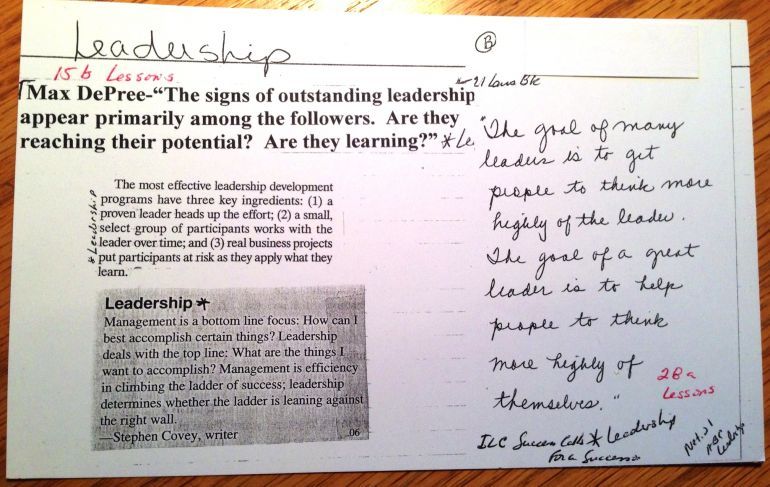by John Maxwell:
As a communicator, statistics, and stories that I use in my lessons and books. For over thirty years, I’ve always answered the same way: I get everything from my files!
I learned a long time ago that if I was going to have something fresh to share every time I spoke, I needed to read and study what others had to say on a variety of subjects. And I needed a system for capturing what I’d read so I could retrieve it later. It’s easy to read a great article and think, “I could use that sometime!” But finding it later, when you actually need it, requires a system.
Today I’m going to share with you my system for filing and retrieving great material. It may not be the best system for you; in fact, it’s a little primitive in this age of technology. But it’s worked well for me for years, and if you adapt what I do for your own use, you’ll always have great resources at your fingertips – for speaking, writing, or just your own personal growth.
Where I File:
 I have two main systems for filing away the quotes and materials I collect: index cards and lateral files.
I have two main systems for filing away the quotes and materials I collect: index cards and lateral files.
Index cards: I use 5×8 cards, which are filed alphabetically in card boxes. They contain quotes and short passages on front and back, written out or taped on with sources included whenever I know them. As soon as a card on a topic fills up, I just start a new card. I have hundreds of quotes for some subjects, and just a few for others. For example, I have quite a few cards for “delegation,” and not quite as many for “management.”
Lateral files: These cabinets are stuffed with manila folders in hanging files, arranged alphabetically by subject. Each subject folder contains larger pieces, like magazine or newspaper articles. If a folder gets too full, I just start another one, which I file behind it.
Trivia Question: How many 5×8 cards (covered front and back) do you think I’ve filed in the course of 30+ years? **look for the answer later in the post
Important note: I get asked all the time for the list of topics that I use. Here’s my answer: My list doesn’t matter. Don’t create a list of topics and try to fill them. Instead, create your topics as you find material that you want to file. You know what you speak or write about, and this will give you a personalized filing system that’s easy for you to search through and use.
How I Read:
Books: I mark them up as I read. I put brackets around sentences and paragraphs that contain ideas, quotes and illustrations that stand out. In the margin next to each I write the subject under which I want it filed. Then for each item, I turn to the inside of the front cover and write down the page number and subject. I do this throughout the book. Really good books will end up with dozens of passages listed inside the front cover.
Articles: I cut or tear the entire article out, writing the subject and source at the top. (I staple multiple pages together.)
How My Staff Files For Me:
(Because you know I delegated this task as soon as I had someone to delegate it to.)
Quotes from books: With a marked-up book, a staff member consults the list at the front of the book to find the passages I want to collect. They make copies of all of those pages. Then they cut each selection out, tape it to a 5×8 index card under the appropriate subject, and write in the source. After so many years of collecting, at least one card probably exists for almost every subject I want to file. If one doesn’t, my staffer just creates one.**I have approximately 4,000 individual cards filed away.
Articles and longer passages from books: Articles are filed in their entirety in manila folders under a subject, with the source noted. Passages from books are copied, then stapled together with the source written in. My office contains hundreds of these files in multiple lateral file cabinets.
How I Use My Files When Writing:
The files I’ve described are what I draw from whenever I write. For whatever I’m writing, my first step is always to pull out all the files and cards on that subject and place them on my desk beside my legal pad, scissors and scotch tape. (I also carry these supplies in my briefcase at all times.)
My one nod to technology in my office is a copy machine. On it I make duplicates of everything I want to use, since I don’t want to cut up my cards. (I still have all of my original cards, going back 30+ years.)
I start writing on my legal pad. Then whenever I want to use a quote or article, I cut out the passage from the photocopy and tape it right into my outline (writing in the source). If it’s from a card, I mark the original card to indicate the lesson or book I’m using it for. That way I can avoid delivering the same illustrations to the same group of people.



